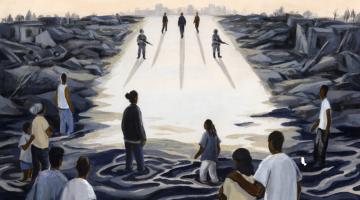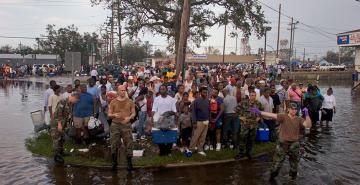The author dissects Black time and space in order to better understand the nature and mechanics of Black life and death lived in the antiblack world.
“Black time is ‘untime,’ and Black space is ‘nowhere.’”
In this series, we ask acclaimed authors to answer five questions about their book. This week’s featured author is John Murillo III. Murillo III is Assistant Professor of African American Studies at the University of California, Irvine. His book is Impossible Stories: On the Space and Time of Black Destructive Creation.
Roberto Sirvent: How can your book help BAR readers understand the current political and social climate?
John Murillo III: In Impossible Stories, I dissect Black time and space—Black spatiotemporality—in order better understand the nature and mechanics of Black life and death lived in the antiblack world. Theoretical questions about the relationship between Black folk and history, memory, the passage of time, the problem/question of “progress,” the ability to “belong” somewhere, and the capacity to move through and occupy a place animate my writing and thinking throughout, as well as the literary works I curated for the analysis.
But more importantly, my work depends on a profound concern for the ways Black folk speak to and experience Black time and inhabit Black space. Every theoretical claim and manicured line breathes a debt to narratives of Black life and death that signal the destructive consequences of Black temporality and Black spatiality as they are in the antiblack world. I frame all the analysis and theorizing with all-too familiar narratives of antiblack violence that, once explored more deeply, reveal how Black time is “untime,” and Black space is “nowhere”—that the everyday spectacular violence visited upon Black folks creates a Black existence that is crucially, terribly, and generatively out of alignment with standard, linear-progressive (read: Human) experiences of time, and out of step with normative ideas about the inhabitation and formation of space(s).
I say all this to arrive at the larger question I’m asking before and after all the timey-wimey, spacey meditations: What have we made, can we make, and must we make from our “untimeliness” in the middle of “nowhere?” And also, how do we undertake this kind of creation, the kind that uses our destruction as originary material, as prima materia, whether that creation takes place in streets, on screens, on pages, or elsewhere, now or whenever?
Impossible Stories analyzes literature, narrates Black experiences, and draws from physics in order to speak to this essential part of Black work: this ceaseless taking-up of destruction in order to make time when there isn’t any for Black folk, and make a way when there is no way. What we’re seeing out in the streets now, the ongoing protracted struggle on behalf of George Floyd, Breonna Taylor, Toni McDade, and all the named and unnamed and unrecorded folk who have died and will die in the name of the antiblack world, is, at its fundament, a transmutation of our own destruction into creative political action (that itself is generatively destructive, in the name of the unnamable political project of building another world). I think my work sheds light on that destructively creative, creatively destructive practice.
What do you hope activists and community organizers will take away from reading your book?
I hope that both find something complementary to the ongoing, active refusal to accept the world as is. The work is an assessment of the influence of Black spatiotemporality on Black work: on what we do, how we do it, and what’s at stake in doing it. It is not meant to “lead” anything or anyone, but to parse out the mechanics, stakes, and possibilities of doing our various forms of Black work when we more precisely understand and actively embrace the spatial and temporal characteristics of Black life and death in the antiblack world. I think there is utility in that, but I don’t want to misrepresent this as some kind of guidebook. I just think that in analyzing what I believe are essential elements of Black life, work, and death in the antiblack world can be useful in shaping all of the work we do, possibly sharpening it, or maybe just honing it.
We know readers will learn a lot from your book, but what do you hope readers will un-learn? In other words, is there a particular ideology you’re hoping to dismantle?
I very seriously hope readers un-learn something we all uncritically hold to be true, or universal: the experiences of time and space. There are many more analyses of the problem of Black space, and many of the forms those problems take in the real world—e.g. gentrification—are more widely accepted as issues that represent that larger problem of Black spatiality. I have “new” things to say about that, but this problem isn’t as pressing as the other.
As Michelle Wright notes in her own Physics of Blackness, there are consequences to the uncritically accepted notion that the word “time” names some universal experience of linear progress that all humans share. Perhaps that is true if we recognize that Black folk, in the antiblack world, don’t get to be human, except perhaps biologically: as far as humanity in the sociopolitical world is concerned, we do not bear the accoutrements of human life; this is a consequence of living in what Saidiya Hartman calls “the afterlife of slavery” and what Christina Sharpe dubs “the wake.” The distended temporality of slavery, the way the “time” of enslavement reaches into, shapes, interrupts, twists, and disappears all time after it via the antiblack world’s political systems and structures, its ideologies and values, and the minds, hearts, and behaviors of every single individual, warps Black folks’ experience of time in ways that affirm our sense of the world, of “progress,” and of the possibilities of the future.
So mainly, I would hope we could un-learn an acceptance of time as linear or coherent for Black people.
Who are the intellectual heroes that inspire your work?
The list is insanely long, here, and some folk are on it for many more reasons than one. Reducing this list to a few people is like naming the top 5 in my NBA pantheon.
So, so, so many names, and in no particular order: Toni Morrison; D’Juana Murillo; John Murillo; Chinyere Cindy Amobi; Frank B. Wilderson III; Jared Sexton; Bridget Cooks; Tiffany Willoughby-Herard; Saidiya Hartman; Hortense Spillers; Octavia Butler; Selamawit Terrefe; Jaye Austin Williams Nicholas Brady; Jerome Dent; Macala Lacy; Zakiyyah Iman Jackson; Patrice Douglass; Darol Kae; Lashonda Carter; Janisha Gabriel; Taijah McDougall; Kiese Laymon; David Marriott; Chanda Prescod-Weinstein; Ashon Crawley; Kara Hunt; Benjamin Ndugga-Kabuye; Sheree Greer; Susana Morris; I’Nasah Crocket; C. Riley Snorton; Tiffany Barber; Jared Rodriguez; Tabias Olajuawon Wilson; Delia Younge; Tiffany Lethabo King; Michael J. Dumas; Alexis Pauline Gumbs—there are so many. I know I’m leaving some out, living and dead, but this is a glimpse. My deepest apologies to those I did not name.
In what way does your book help us imagine new worlds?
Impossible Stories asks us to reimagine Black work, all of which is inherently creative, be it activist work and political organizing, novel- and poetry- and song- and story-writing, as destructive work. This is not some new discovery, but it is naming an important tendency or undercurrent of Black work that I don’t think is often framed this way.
My perspective is a predominantly afropessimist one, and one of the most frustrating questions lobbed at afropessimism is: “Well, what are we supposed to do with that, then (if everything is as bad or as deeply ‘impossible’ as you say it is)?” Usually, the question aims to take what I interpret as a very understandable frustration with the truth or resonance or applicability of this theoretical framework to what Black folk are actually seeing in the world and, rather than aim it out at the world creating the problems afropessimism names, aiming it at the one doing the theorizing that names the problems—basically, the question is asked as a way of trying to kill the messenger because of the message, and not the system of domination we name and its agents around and within us. But with the advent of more and more writing that avows afropessimism and wields it as guide toward new questions, new claims, new terms, and new possibilities, responses to “what are we supposed to with that?” are becoming clearer.
This is my entry into the growing collection of voices and works that uses afropessimism in this generative manner. In my own way, I am saying that this world has no time and no space for Black life; that Black time and Black space are violently incongruous with the time and space of the antiblack human world; and that our task is to take those facts that unmake, or destroy us, as the stuff with which we might create a radically different world.
To answer the question, “What are we supposed to do?”, differently, we must take the constitutive, destructive features of being Black, with no place to be and no time to spare, and wield, rather than ignore or misrepresent, these things that (un)make us to do the impossible work we all are trying to do, whatever the tagline or slogan or school of thought we bear.
Roberto Sirvent is a teacher living in California.
COMMENTS?
Please join the conversation on Black Agenda Report's Facebook page at http://facebook.com/blackagendareport
Or, you can comment by emailing us at comments@blackagendareport.com



















